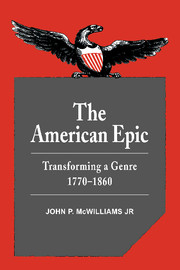7 - Till a Better Epic Comes Along
Published online by Cambridge University Press: 22 March 2010
Summary
It is a mistake, I think, in the criticism of Melville's works, to approach Moby-Dick as a novel. On the surface it is a novel; it is a prose narrative of a certain length, dealing with possible men and possible events. But below the surface it is different. The men are possible but they are also fabulous. The prose loosens into extraordinary rhythms. The event is possible, but it is also unique – it is nothing less than the pursuit of “the mightiest animated mass that has survived the flood.” What Herman Melville proposes to himself is not the theme for a novel but the theme for an epic.
Padraic Colum, The Measure (1922)Colum's claim that Moby-Dick is an epic may be more plausible than the longstanding assumption that Moby-Dick is the quintessential American Romance, but both generic claims are far more restrictive than the book Melville actually wrote. For Melville has given us, if we look closely, a Yankee Jonathan's sea initiation, an Anatomy of whaling, several oral tales within one written one, two parodic sermons, occasional poems, a dream vision, many meditations, an etymology, genealogies, a dramatic tragedy, a romance, several hideous and intolerable allegories, and a mockepic, as well as an epic. The power of Melville's book thus depends on the intellectual energy released by its continuous transformations of genre and of idea.
- Type
- Chapter
- Information
- The American EpicTransforming a Genre, 1770–1860, pp. 187 - 216Publisher: Cambridge University PressPrint publication year: 1989



